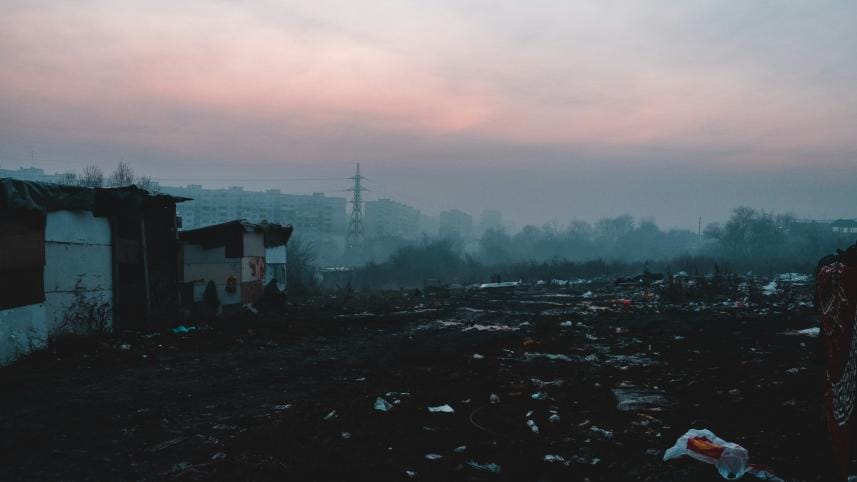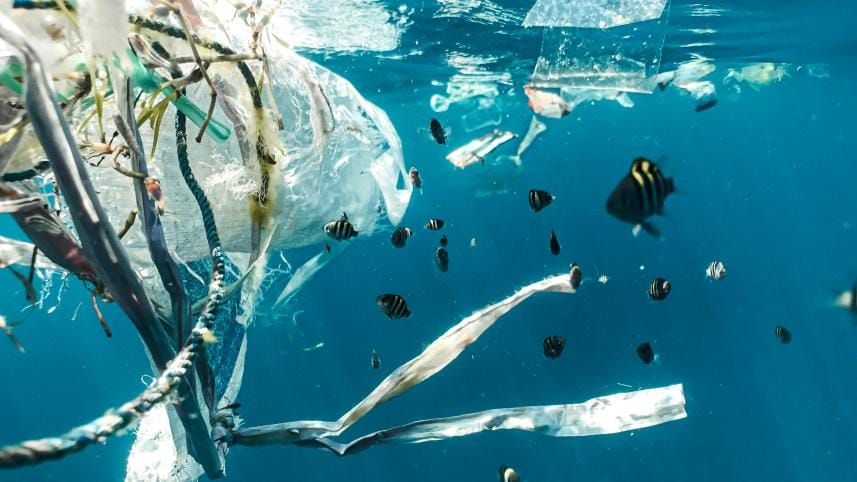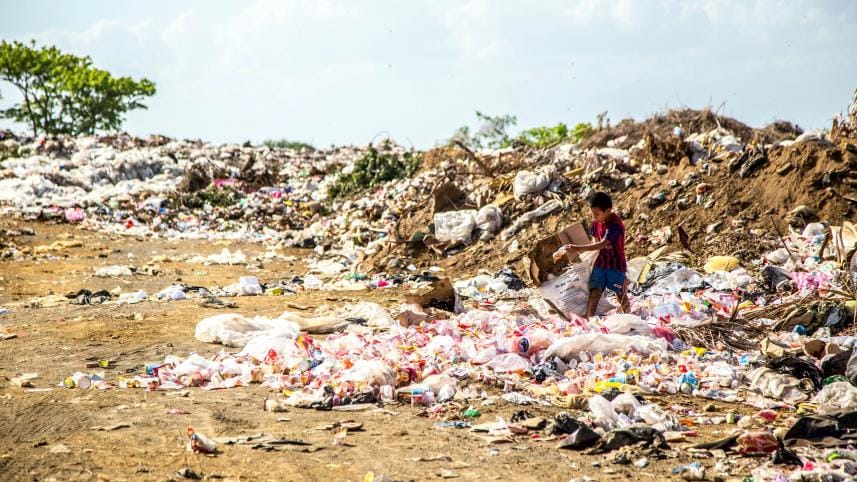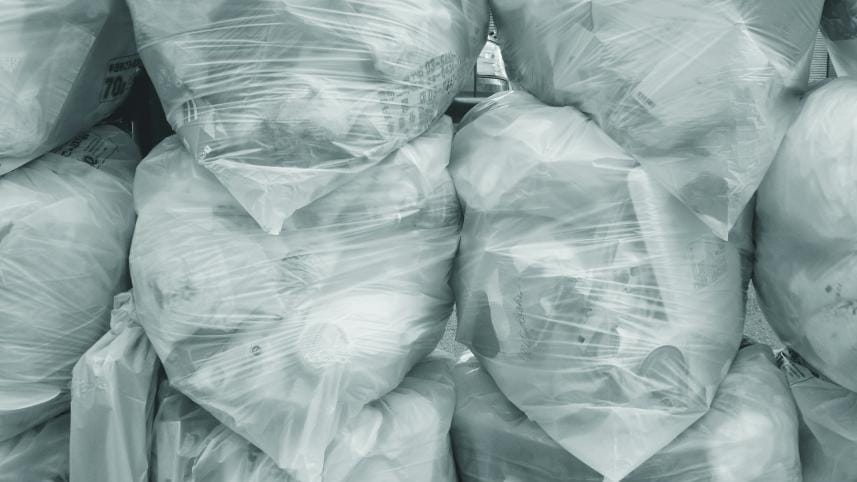Why polythene bags are bad for you

Few items are as ubiquitous in modern life as the humble polythene bag. Lightweight, cheap, and readily available, polythene bags are handed out daily across Bangladesh, used to carry everything from groceries to clothing. Yet, their convenience belies a dark side: these bags are a serious threat to human health, wildlife, and the environment. In light of Bangladesh's recent ban on polythene bags it's critical to understand why these bags have become a symbol of environmental peril and why curbing their use is a matter of urgency.
A slow poison for the environment
Polythene bags are primarily composed of polyethylene, a plastic that takes an estimated 500 to 2,000 years to degrade. Each bag we use today will outlast not only our own lifetimes but those of countless future generations, lingering in landfills and waterways. In Bangladesh, where waste management is often inadequate, vast quantities of these bags are discarded haphazardly, accumulating in rivers, drains, and even farmland. Their slow degradation exacerbates pollution, as they break down into microplastics that infiltrate the soil and water, eventually entering the food chain.

This impact is starkly evident in the rivers and seas surrounding Bangladesh. Plastic waste chokes the waterways, with the Ganges River System alone acting as a significant conveyor of mismanaged plastic to the world's oceans. In fact, according to estimates, 89% of plastic waste in Bangladesh's coastal areas is mismanaged, much of it ending up in the Bay of Bengal. With such high levels of pollution, the country's rich marine biodiversity is at risk, and plastic waste continues to pose a long-term threat to ecosystems that are already struggling due to climate change and overfishing.
Threat to human health
Plastic waste doesn't just harm the environment; it's also a silent threat to human health. Polythene bags contain a range of harmful chemicals, including Bisphenol-A (BPA) and phthalates, both of which are known to disrupt hormonal balance in the human body. These chemicals leach into food items when heated or stored in plastic containers, potentially leading to a variety of health issues, including cancer, reproductive problems, and developmental issues in children.
Burning plastic waste—often the only disposal method available in rural areas—releases toxic compounds like dioxins and furans. Inhaling these substances can aggravate respiratory issues, while exposure to BPA and phthalates is linked to an increased risk of asthma, obesity, and even heart disease. For a country like Bangladesh, where healthcare resources are stretched, the health risks posed by plastic pollution create additional burdens, particularly among lower-income communities who are disproportionately affected by poor waste management and environmental degradation.
Wildlife at risk
Plastic waste also poses a direct threat to wildlife, particularly in coastal and marine areas. Animals such as sea turtles, whales, and birds often mistake polythene bags for food, with fatal consequences. Sea turtles, for instance, frequently confuse floating plastic bags with jellyfish. Once ingested, the plastic obstructs their digestive systems, causing starvation or internal injuries. A recent report indicated that over 100,000 marine animals die each year from plastic ingestion alone, and this number is expected to rise as plastic waste continues to pile up in the ocean.

In Bangladesh, polythene bags also clog drainage systems, causing urban flooding that displaces not only people but also disrupts wildlife habitats. This is particularly problematic in Dhaka and Chittagong, where blocked canals and sewage systems exacerbate monsoon flooding, leading to waterlogged streets and breeding grounds for diseases like dengue and malaria. The disruption of these urban ecosystems highlights a pressing need for effective waste management to protect both human and animal populations from the consequences of plastic pollution.
Clogged drainage: a deadly hazard
One of the most visible and immediate threats posed by polythene bags is the blockage of drainage systems. Bangladesh experienced severe flooding in the late 1990s, partly due to plastic-clogged drains. When drainage systems are blocked by non-biodegradable waste, floodwater cannot flow, leading to prolonged inundation in urban areas during monsoon seasons. This not only damages infrastructure but also increases the spread of waterborne diseases and creates hazardous living conditions for millions.
In Dhaka, where plastic waste often finds its way into drains and canals, this issue is particularly acute. According to reports, up to 22 of Dhaka's 65 canals have been transformed into dumping grounds for waste, much of which is polythene bags. This obstruction turns minor rain showers into potential flooding events, disrupting transportation, damaging property, and even endangering lives. When floodwaters stagnate, they also become breeding grounds for disease-carrying mosquitoes, increasing the risk of illnesses like dengue and malaria.

Despite a long-standing ban on plastic bags, enforcement remains inconsistent, and vast quantities of polythene continue to circulate, highlighting the need for rigorous policy implementation to safeguard the public from preventable disasters.
The need for circular economy and technological innovation
Addressing polythene pollution requires a shift from traditional waste management to a circular economy model, where materials are reused and recycled rather than disposed of. Advanced recycling technologies, such as chemical recycling and pyrolysis, offer potential solutions for breaking down polythene into its base hydrocarbons, which can then be repurposed as raw materials for new products. Unlike mechanical recycling, which degrades the quality of plastic over multiple cycles, chemical recycling retains the material's integrity, enabling endless reuse.

Furthermore, bioplastics and biodegradable alternatives, made from renewable resources like corn starch or algae, are gaining traction as potential replacements for conventional polythene. While these alternatives currently face scalability challenges, ongoing research into polymer degradation and microbial enzymes shows promise in developing plastics that break down more readily in natural environments.
Taking action for a sustainable future
The cost of cleaning up plastic pollution is high and falls mainly on local governments, many of which are already underfunded. In 2020, it was estimated that up to 30% of Bangladesh's revised budget for the Ministry of Environment, Forest, and Climate Change was spent on cleaning up plastic waste. This substantial expense could be redirected toward other vital areas if the country's plastic waste problem were adequately addressed.
As Bangladesh grapples with these mounting challenges, the government's recent ban on polythene bags is a step in the right direction. The government's five-member committee aims to monitor the ban's effectiveness and ensure that alternative eco-friendly solutions are encouraged. However, lasting change will require a concerted effort from all levels of society. This includes promoting alternatives such as reusable cloth or jute bags, encouraging proper waste segregation at the household level, and raising awareness of the environmental costs of plastic use.
Polythene bags may be convenient, but their cost to our environment, health, and economy is too high to ignore. The ban on polythene bags in Bangladesh represents a critical opportunity to shift towards a more sustainable future. On an individual level, reducing the use of plastic bags and opting for reusable materials can make a tangible difference. Supporting policies that discourage single-use plastics and advocating for stronger waste management infrastructures are also essential in tackling the plastic menace head-on.



 For all latest news, follow The Daily Star's Google News channel.
For all latest news, follow The Daily Star's Google News channel.
Comments